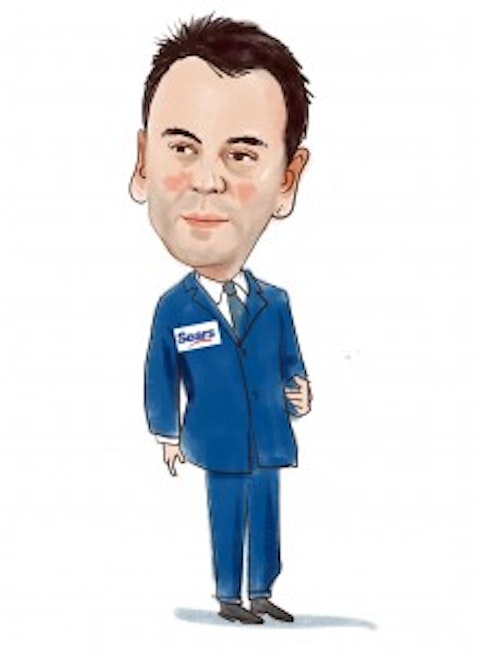In a detailed profile, Bloomberg Businessweek argues that much of Sears Holdings Corp (NASDAQ:SHLD)’ recent troubles can be attributed to the mismanagement of the company. Specifically, Bloomberg paints a picture of Lampert as an Ayn Randian-obsessed free market fanatic, pushing overly aggressive, internal dog-eat-dog competition.

Microsoft’s stack ranking
The profile of Lampert is fascinating, but it reeks of hindsight bias. If Sears Holdings Corp (NASDAQ:SHLD) was riding high today, the article likely would not have been written.
It’s remarkably similar to Vanity Fair’s August 2012 piece on Microsoft Corporation (NASDAQ:MSFT). In that article, CEO Steve Ballmer was criticized for missing numerous technological trends over the course of the last decade — smartphones, tablet computers, social networking.
Vanity Fair attributes Microsoft’s failure to its management system. Microsoft Corporation (NASDAQ:MSFT)’s “stack ranking” is thought to increase infighting as it requires employees to constantly compete with one another.
But if you sold your Microsoft shares after reading the piece, you would’ve missed out on one of the greatest surges in Microsoft’s recent history: since the beginning of last August, shares are up better than 20% (not to mention the steady dividends).
Despite the failure of Windows 8 to rejuvenate the PC market, Microsoft Corporation (NASDAQ:MSFT)’s future looks bright. Stack ranking or not, Microsoft’s Azure is increasingly becoming a dominant force in the public cloud space, helping to offset the decline of the company’s Windows business.
Microsoft says that over half of the Fortune 500 are now using Azure, while hedge fund ValueAct likes Azure enough that it committed $2 billion of its capital to Microsoft on that basis alone.
Best Buy ends working from home
Best Buy Co., Inc. (NYSE:BBY)’s new CEO Hubert Joly ended the company’s practice of working from home back in March. Prior to that, the company had embraced a management model known as the Results Only Work Environment.
The architects of ROWE criticized Joly’s move. In a blog post, they said the company was embracing “last century” management practices, and that ROWE itself was not to blame for Best Buy Co., Inc. (NYSE:BBY)’s failure.
Still, Joly’s turnaround — at least so far — looks like a success. Best Buy Co., Inc. (NYSE:BBY) shares are up an incredible 80% since March. Has abandoning ROWE been the catalyst?
Hardly. Rather, the company’s deals with Microsoft and Samsung, in addition to a decent quarterly report in May, have gone a long way to boost shares. At the same time, a number of Wall Street analysts have turned bullish on the stock.
Most recently, Credit Suisse upgraded Best Buy, and gave the stock a $40 price target. The firm believes that the company is turning its stores into an “offensive weapon” and successfully cutting costs.
The decline of Sears
Don’t get me wrong, I’m not bullish on Sears Holdings Corp (NASDAQ:SHLD). I just don’t think investors should factor in Lampert’s love of Ayn Rand when they decide to buy or sell the stock.
Much more pertinent is the fact that Sears Holdings Corp (NASDAQ:SHLD) is an unprofitable company in a struggling industry. Just recently, Sears had to sell its warranty division to avoid running out of cash, and the industry that it still primarily operates in — middle class department stores — is not a high growth area.
Although Ron Johnson failed to turn around J.C. Penney Company, Inc. (NYSE:JCP), he was at least able to see the situation for what it was. In the presentation he gave shortly after taking the CEO job, Johnson noted that the American department store has been steadily losing market share to its specialty store rivals. In 1992, department stores had nearly 60% of the market — today it’s about half that.
Sears Holdings Corp (NASDAQ:SHLD) bulls have argued for the stock with a sum-of-the-parts valuation. Most notably, hedge fund manager Bruce Berkowitz has argued for Sears on basis of the company’s real estate holdings.
But, as analysts at Credit Suisse point out, why does the company continue to operate if its assets are so valuable? Shouldn’t liquidation be preferable to operating at a loss?
Investing around management structure
No doubt management systems play a role in attracting (or driving away) talent. But unless you’re a direct insider, the situation is just too complex to factor into investment decisions. Stories about horrific management structures seem to only appear after the fact, making them virtually useless for fundamental analysis.
Based on the stock’s decline, Eddie Lampert has already ruined Sears Holdings Corp (NASDAQ:SHLD) — infighting or not.
The article Is Eddie Lampert Ruining Sears? originally appeared on Fool.com and is written by Salvatore “Sam” Mattera.
Sam Mattera owns shares of Best Buy. The Motley Fool owns shares of Microsoft. Salvatore “Sam” is a member of The Motley Fool Blog Network — entries represent the personal opinion of the blogger and are not formally edited.
Copyright © 1995 – 2013 The Motley Fool, LLC. All rights reserved. The Motley Fool has a disclosure policy.





